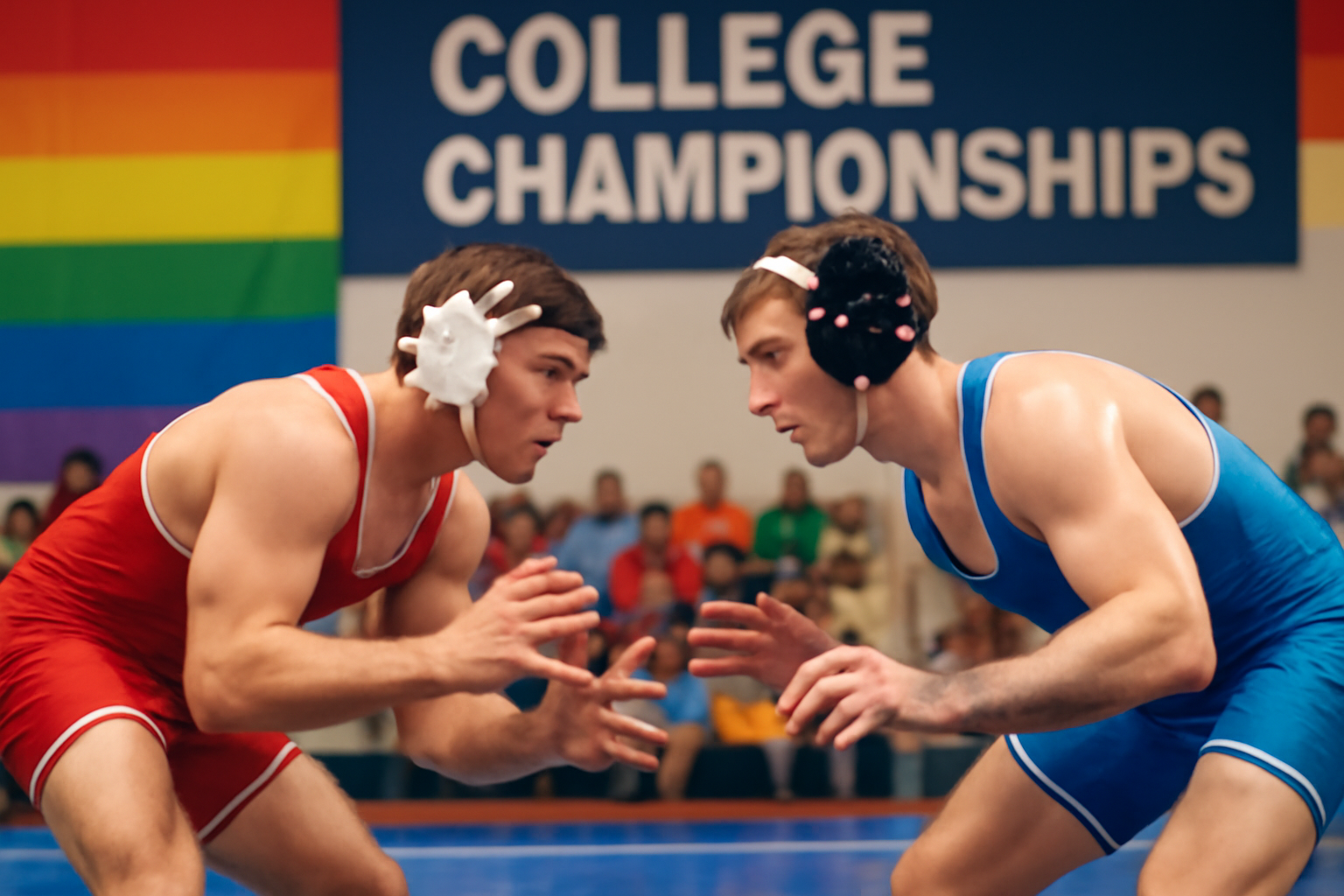
As the excitement of March Madness captures the nation, another thrilling competition is underway: the NCAA men’s college wrestling championships. This event has increasingly caught the interest of gay men, whether or not they are traditional sports fans. The intense athleticism, dedication, and yes, the homoerotic undertones, make college wrestling a fascinating spectacle.
Wrestling: A Sport That Transcends Boundaries
Wrestling has a storied history of breaking boundaries and fostering inclusion, particularly for LGBTQ+ athletes. Men’s wrestling has had its share of stereotypes, often focusing on the tight uniforms and close physical contact. However, these stereotypes haven’t deterred gay men and the LGBTQ+ community from embracing and excelling in the sport.
Figures like Hudson Taylor and Akil Patterson, both former college wrestlers, have been pivotal in promoting LGBTQ+ inclusion within sports. Their efforts, alongside organizations like Wrestling Without Borders, have ensured that wrestling remains an open and accepting space for everyone.
The Athleticism and Dedication of Wrestlers
The athletes competing in the NCAA wrestling championships are some of the most talented and hardworking individuals in sports today. Their physical prowess and commitment to their craft are evident in every match. Beyond physical fitness, wrestling demands mental toughness and resilience, qualities that resonate with fans of all backgrounds.
This year, the championships have even attracted the attention of the President, highlighting the significance and appeal of the event. His presence underscores the cultural importance of wrestling in America, and perhaps also its growing appeal within the LGBTQ+ community.
A Celebration of Fitness and Talent
Throughout the championships, photographers like Bill Streicher have captured stunning images, showcasing the athletes' physicality and the intensity of their matches. These visuals are not only a feast for the eyes but also a testament to the hard work these athletes put into their sport.
For many in the LGBTQ+ community, these championships are an opportunity to celebrate athletic excellence and the diversity within sports culture. It’s a chance to connect with fellow fans and athletes, sharing in the excitement and camaraderie that such events foster.
The Role of Social Media in Promoting Wrestling
Social media has played a crucial role in promoting wrestling to a broader audience. Platforms like Instagram and Twitter are filled with posts from organizations such as USA Wrestling and NCAA Wrestling, as well as from individual athletes. These posts often highlight key moments from matches, celebrate athletes' achievements, and engage with fans directly.
Accounts like @usawrestling, @luttelens, and @theopenmat provide fans with a closer look at the wrestling world, offering insights and updates that traditional media might miss. This engagement helps to build a community around the sport, bringing together fans, athletes, and supporters from diverse backgrounds.
Conclusion: Wrestling as an Inclusive Sport
As the NCAA Division I college wrestling championships continue to unfold, it's clear that wrestling is more than just a sport; it’s a community. It’s an arena where talent, dedication, and inclusivity are celebrated, and where the LGBTQ+ community has found a home.
Whether you're a long-time fan or new to the world of wrestling, these championships provide an opportunity to appreciate the incredible athletes and the inclusive spirit of the sport. As we look forward to the final matches, let’s celebrate the unique blend of athleticism and culture that wrestling brings to the table.
Stay connected with the latest in LGBTQ+ sports by subscribing to our newsletter, and never miss a story about your favorite athletes and inspiring moments in sports.
Related Posts
Triumphant Trans Woman Wins Legal Battle and Inspires Others to Stand Up for Their Rights
Breaking new ground: a landmark victory in transgender rights After battling in courtrooms and enduring endless challenges, Diana Portillo, a transgender woman, has secured a monumental victory in her decade-long fight against workplace discrimination. The result? Nearly $1 million awarded in a historic settlement. But this isn't just a win on paper—it represents a powerful precedent in combati [...]
Pride Month in Latin America: Protests and Demands for Equality
**Celebrating Pride and advocating LGBTQ+ rights in Latin America** Pride Month in Latin America was a lively mix where celebration met activism. Communities united, not just throwing a party but making a stand—demanding equality and pushing governments toward better protection and rights recognition. Throughout Latin America, pride events erupted in marches and cultural displays, each with a c [...]
Transgender Erasure Actions Implemented by National Park Service
```html Trump administration's impact on national park service and transgender recognition The Trump administration made notable moves in undermining transgender representation, which included directing agencies like National Park Service not include "T" and "Q" when they refered “LGBTQ” in any official communication. This move seems part a broader plan by this administration aimed at reducin [...]